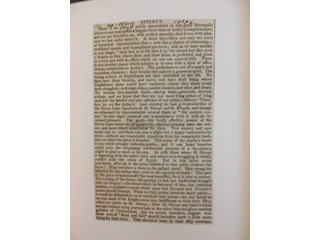Transcription
ASTLEY’S.
There is no place of public amusement in this great Metropolis where a man may spend a happier hour than at Astley’s Amphitheatre; and we can therefore say, with perfect sincerity, that it was with pleasure we last night visited it. In these days there are only two sorts of theatrical representation that a man has a chance of witnessing—mutilated operas, and unmutilated spectacle; and, as we hate murder in any shape, “most foul as in the best it is,” we cannot but like such a theatre as this, where show, and show alone, is professed, and given in a style and with an effect which no one can quarrel with. There is also another reason which induces us to turn with a kind of affectionate satisfaction to Astley’s. The performances are of a manly and ennobling character; they breathe throughout a generous spirit. The daring actions of Englishmen are here embodied to the life. We have seen them breathe and move, and have their being where Englishmen alone would have ventured—where they alone would have struggled—in foreign climes, amidst disaster, and want, and death. We witness lion-hearted deeds—daring feats—generous, devoted actions, and we know that they are not mere lying scenes of lying men, but the faithful and just epitome of our nation’s history. Therefore do we like Astley’s. Last evening we had a re-production of the Drury-Lane Spectacle of St. George and the Dragon, and though we witnessed its representation several times at “the ancient corner,” we last night renewed out acquaintance with it with an increased pleasure. The good---the really effective scenes of the Drury-Lane house are all preserved---the less pleasing ones are out, out, and have others substituted for them. New scenery and new music met us, and there was also a slight but happy variation in the story---without any remarkable departure from the remarkable tradition on which the piece is founded. The scene of the reptile’s haunt is one which strongly indicates genius; and it can boast beauties which even the surpassing intellectual prowess of a STANFIELD might be glad to mark as his own. So with those where St. George is departing from his native land, and where he is struggling in deadly conflict with the curse of Egypt. But in this latter scene how much, after all, is the artist indebted to that noble creature the horse? What devotion is there in the gallant steed! How strong his affection for his daring rider, even in the agonies of death! This part of the piece is undoubtedly the most beautiful, for it is true to nature. The rearing of the horse—his pawing (a last, but ineffectual struggle with the dragon)—the dread which he betrayed of fire—his tottering motion—completed a scene which none but DUCROW and DUCROW’s horses would attempt. While we fully praise—we are bound to say that some of the Knights were very indifferent to their duty. They relied too much on St. George. Now St. George was hard-worked enough without being journeyman to the other fiery and glory-seeking gallants of Christendom, and we would, therefore, suggest that these men of “flood and field” should hereafter show a little more liking for their work. They should at least do their duty conscien-
